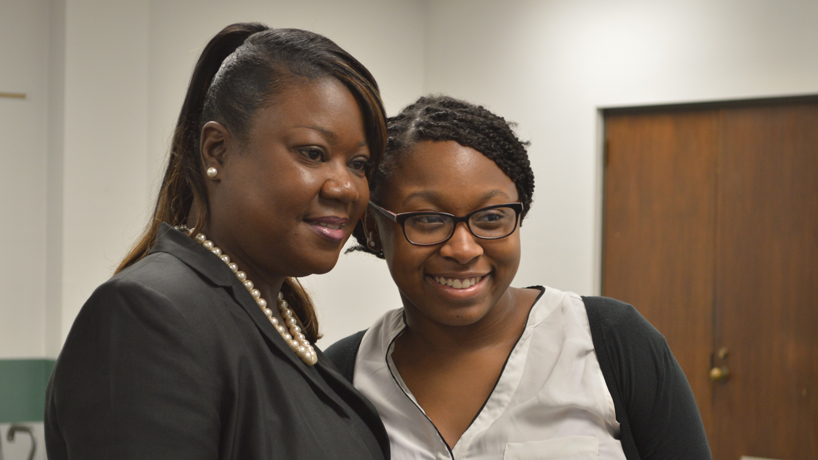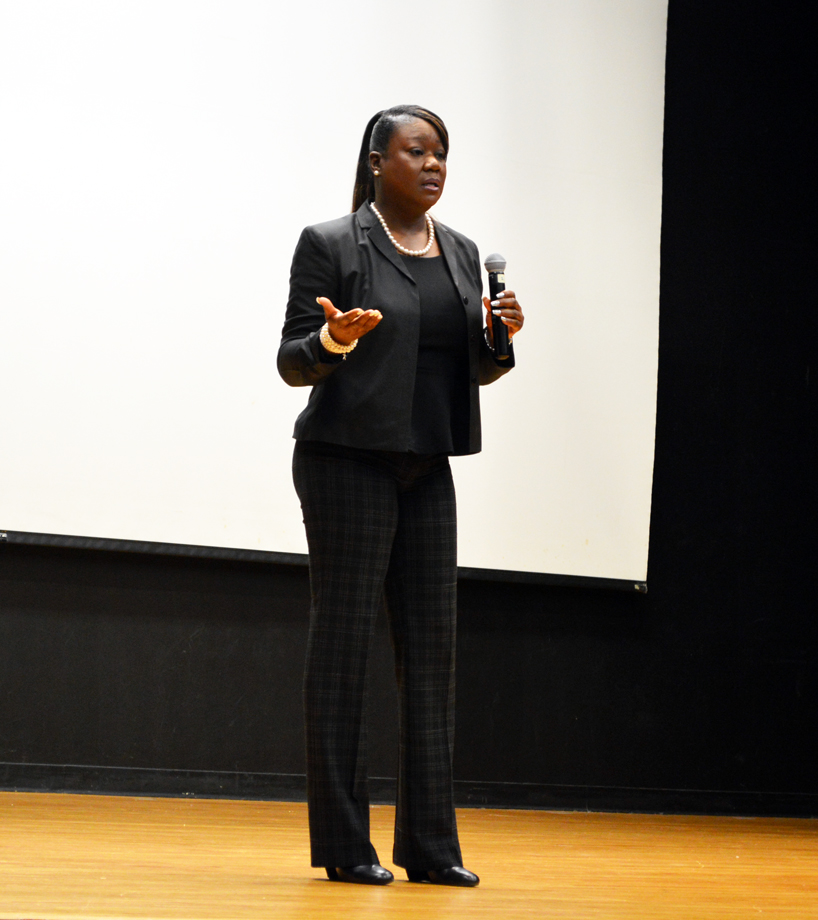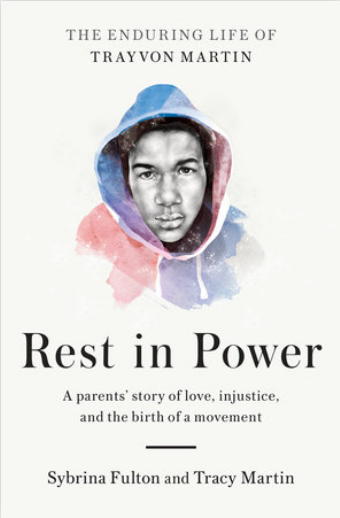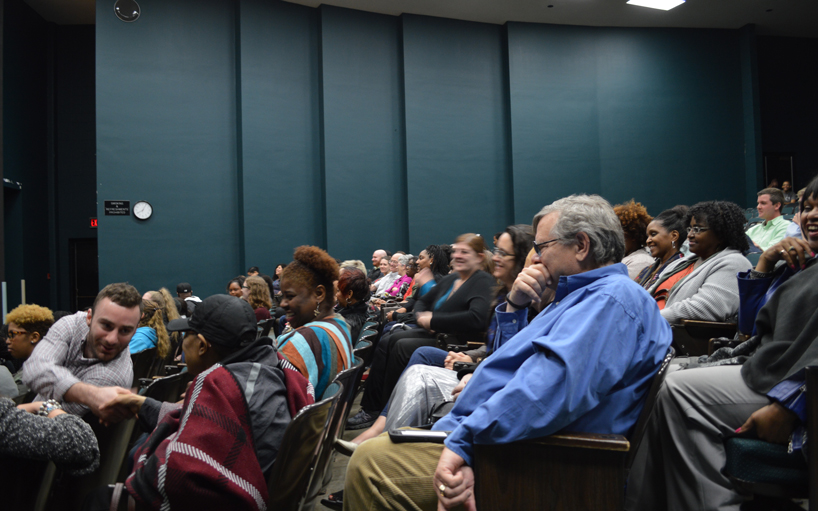
Five years ago this week, Sybrina Fulton (at left) lost her son, Trayvon Martin. She spoke at UMSL Feb. 22 and met afterward with UMSL students including sophomore nursing major Imani Reid. (Photos by Evie Hemphill)
For Sabrina McGuire and many of her classmates at the University of Missouri–St. Louis, the opportunity to simply sit and listen to Sybrina Fulton speak from her heart was all that mattered last Wednesday night.
“I wanted to hear how she felt,” said McGuire, a junior communication major at UMSL. “I never got to hear that part in the media.”
Fulton, who shared her journey as part of the Office of Student Involvement Speaker Series, wanted to emphasize that she’s just like anyone else.
“I’m going to start off by telling you how average I am – and how average a mom I am and will continue to be,” Fulton said after being introduced by Brandi Fields, president of UMSL’s Associated Black Collegians.

The Office of Student Involvement Speaker Series event drew a large crowd to the J.C. Penney Auditorium Wednesday night.
Before a large crowd gathered in the J.C. Penney Auditorium, she recalled some of the happiest times with her son Trayvon Martin. The memories elicited smiles and even laughter at points.
“He made this soup that was not so good, but I had to eat it,” Fulton recalled of their interactions around the house. “He was very affectionate… He just did everything for me, and I pretended I couldn’t do things because I knew he’d do it for me.”
But that “average life,” as Fulton termed it, was interrupted on Feb. 26, 2012, by a gunshot wound to her son’s heart. She recalled the phone call that night from her son’s father and the awful days that followed.
“The worst day of my life was Trayvon’s home-going service, where I had to sit in the front of my church and see my 17-year-old son lying in the casket with all white on, as if he was going to a prom,” she told the UMSL audience. “As a mother, the image still bothers me to this day.”
The highly publicized trial of George Zimmerman, the armed 28-year-old who shot Martin and was acquitted of second-degree murder, took a toll on Fulton as well, on top of the sheer sorrow over losing her son. At times she found it difficult to get up in the morning.
“Those were broken pieces, those were my broken days,” Fulton said.
She remarked on the amount of attention given to the fact that Martin was wearing a hoodie when the violent confrontation occurred.
“He was chased, he was pursued, he was profiled, and he was murdered,” Fulton said, adding that her son was also on the phone and did not realize he was being followed. “It’s not about the hoodie. It’s about the ugliness that is going on in this country.”
 Five years later, she’s focused these days on being a voice for the voiceless and an advocate for other families. The book she and Tracy Martin co-wrote, “Rest in Power: The Enduring Life of Trayvon Martin,” was just recently released, and the two have also spearheaded the Trayvon Martin Foundation, which is committed to “ending senseless gun violence.”
Five years later, she’s focused these days on being a voice for the voiceless and an advocate for other families. The book she and Tracy Martin co-wrote, “Rest in Power: The Enduring Life of Trayvon Martin,” was just recently released, and the two have also spearheaded the Trayvon Martin Foundation, which is committed to “ending senseless gun violence.”
“Quite frankly, it’s not something I would have signed up to do… I want my son back,” she said of her advocacy efforts. “What I’ve decided to do is take this situation and try to make the best of it.”
Fulton emphasized that it’s about “all our children.”
“They have a right to live,” she said. “They have a right to grow up just like we did.”
Closing her talk with a call to greater mindfulness and compassion toward fellow human beings, Fulton then took question after question from the audience. One young woman asked Fulton for advice about addressing these topics with her little brother, a person of color who is around the age Martin was when he was killed.
“First of all I would tell him how valuable his life is,” Fulton told her. “Just continue to speak words of encouragement to him.”
Other questions touched on ways to make a difference in local communities and “the message Trayvon’s death gives to the world.”
“You tell me,” Fulton responded to the latter query. When the audience member said it suggests society still has “a long way to go,” Fulton agreed.
“The verdict sent a bad message to our young African American and Latino brothers and sisters … that you can shoot someone and say you were afraid,” she said. “That’s a terrible message to send to our young people.”

In her answer to a question about what individuals can do to help address gun violence, Sybrina Fulton emphasized the need for greater empathy and understanding of differences. At one point, she encouraged audience members to take a moment to say hello to those seated around them.
Fulton urged the crowd to seek both personal growth and active civic involvement as pathways forward.
“Even in the smaller elections, you need to vote, and you need to know what’s on the ballot,” she said, adding that connecting with local organizations is another key way to work together to “stand up and be heard.”
Justice Johnson, a junior psychology major at UMSL, said afterward that she was impressed by Fulton’s strength.
“Just the loss of a son, period, is hard, and she’s come so far and is obviously so passionate,” Johnson said. “It’s admirable that someone can go through something like that and get beat down so bad by the law, the social media, the world period – and still face the world and face the government with her hands and her toes in the ground, full force.”
Sam Cho, a senior media studies major, said the event increased his understanding of the Black Lives Matter movement, which is very important to many of his friends on campus.
“I didn’t really understand the whole issue, and media really didn’t help out with that,” Cho said. “And so I just wanted to hear from her, and to be honest, I’m super moved by Ms. Fulton – her courage and her being able to tell other people that this stereotyping and racism exists and that the justice system needs to change.”
The evening, which included a meet-and-greet where a number of students were able to speak with Fulton individually, was good for the entire campus community, said second-year graduate student Aaron D. Pelloquin.
“It allowed us to sit down and be poured into with love and care and be informed of how relevant Trayvon’s story was and still is,” he said. “I loved how transparent she was with the audience. For me, being a black man and young professional, it was good for my heart.”
And the heart was a recurring theme, noted Pelloquin, who is pursuing his master’s degree in counseling and also serves as a graduate assistant in the Office of Student Involvement.
“Sybrina mentioned and referred to the heart a lot,” he said. “Heart change is valuable, and it was challenging for her to lead us to look at our hearts and those around us.”















